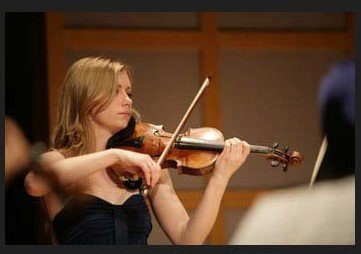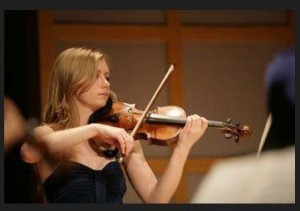

There is no longer the notion of a ‘typical law school applicant’ – the Osgoode student body represents an increasingly assorted lot of personal and academic backgrounds. Among these diverse pre-law histories are those who come from fine arts programs – so many of our classmates bring with them their musical, theatrical, and other artistic talents. This is in many regards thanks to the school’s emphasis of a selection process in recent years, aimed at improving the diversity of the entering classes. Despite the diversity, the talents of those who bring their creative capabilities, through professional training or by self-achievement, are too understated in our community. As a regular column in our beloved Obiter, I propose to highlight the talents and achievements of our artist-students.
Pamela Hinman, now in her third year of law school, is a professionally trained violinist. She started playing as young as three years of age, pursuing it very seriously as she grew up. It was natural for her to consider this as her career, and she studied at the Conservatory at Mount Royal University, as well as at the University of Calgary. She received her Masters of Music Degree in Violin Performance at the University of Toronto. She has been performing and teaching for the past 10 years, performing solo and in orchestra across Canada as well as on the international level.
With such an amazing portfolio, including playing regularly for the Canadian Opera Company Orchestra and the National Ballet of Canada Orchestra, one can naturally wonder why she wanted to come to law school. “There are number of reasons why I decided to go to law school,” she goes on to express:
Working and maintaining a career in the performing arts can be very difficult, and sometimes those difficulties can negatively affect the passion that one has for their craft. I wanted to develop another career that would be equally fulfilling and challenging, and one that would allow me to be free from the pressures of working as a musician so that I could continue to enjoy and love playing the violin.
Pamela also noticed the struggle of arts education initiatives, dwindling audiences, and orchestras going under. She began to think about how to better advocate of the arts and artists in our society. “Law school seemed like a good place to start,” she says. She explains that she had always thought about going to law school – in learning how the law is shaped, and how policies are created and implemented. “Osgoode turned out to be the perfect place for me to pursue these interests. I think that the large and diverse student body here, along with the exceptional faculty and administration, create an open environment for a student to pursue an original and personalized career path in law.”
How does one apply the skills of a musician to the study of law? Pamela commented that in many ways, her music background was helpful for law school. As the business of music is incredibly competitive, her years of experience in the field prepared her for many of the adversarial aspects of law school. For instance, in mooting – the skills of performing on stage gives one an edge in their ability to present to an audience. As well, musicians are trained to persevere through intensive practicing, for hours on end. Pamela recalls forcing herself into practice rooms for 4 to 8 hours a day. In many respects, this helped her in focusing on her studying for her classes.
Pamela also takes an active role to promote the arts at Osgoode. She started the Osgoode Fine Arts Collective, a group intent to bring together Osgoode students through their common experiences and appreciation in the fine arts, and to raise awareness and appreciation within the Osgoode (and the legal communities at large) of the valuable individual and social benefits that the fine arts provide.
“I know that all of our members realize the benefits of the arts, and we want to make sure that the arts remain present in the minds of our friends and colleagues at law school as they go out into the world and start their careers,” she says.
Pamela has a unique perspective and vision of the role of law and the lawyer:
Many law students will have opportunities to shape law and policy, and to be influential in various social and public initiatives. In difficult economic climates, the arts are sometimes seen as extraneous, and frivolous. We want everyone to understand that this is not the case. Many studies support the position that engagement with the arts helps to create healthy communities, and helps to foster tolerance and understanding between communities. Arts education in youth is linked to increased cognitive development, success in employment, and creativity in solving problems. These are just a few of the benefits!
As one of OFAC’s first organized events, Pamela has gathered a string quartet for an inaugural performance on November 13. This performance is the first of a concert series, which hopes to offer the Osgoode community a chance to hear a range of types of performances by Osgoode students and outside guests, and to gain insight into the ways in which performers use their tools to effectively convey their ideas through music. Pamela is joined by fellow Osgoode student, Nadia Klein on the Cello, as well as Carolyn Blackwell on the Viola and Ivan Ivanovich on the violin.
You can get involved with the OFAC by e-mailing osgoodefinearts@gmail.com. OFAC is open to any student initiatives and presently, it is specifically looking for written support for Osgoode’s Arts Initiative. Additionally, OFAC welcomes anyone interested in performing in their concert series.
